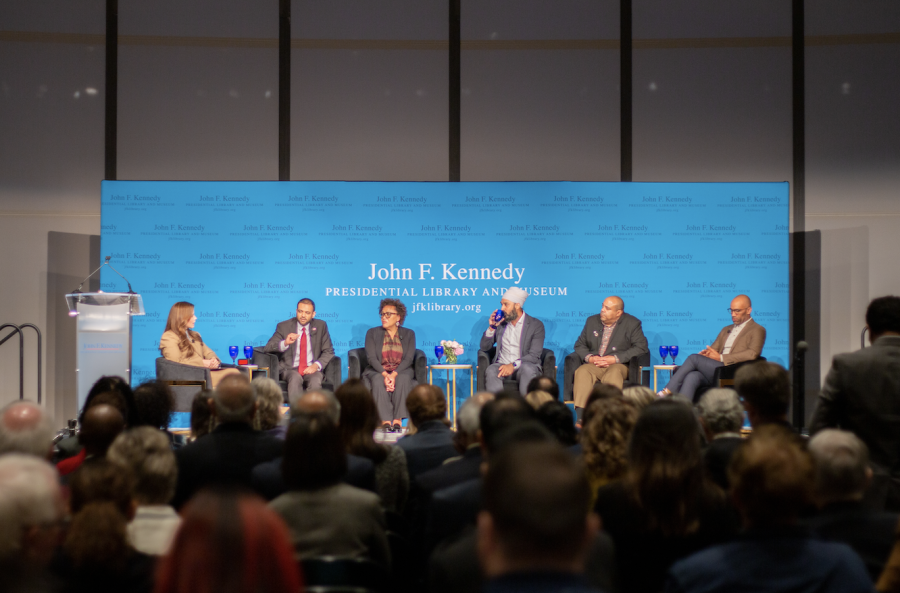On Tuesday, April 11, the Second Gentleman of the United States Douglas Emhoff addressed about 200 people at the John F. Kennedy Presidential Library and Museum. Second Gentleman Emhoff presented opening remarks on the role of arts and culture in combating hate and building strong communities. Followed by Emhoff’s remarks, there was a panel discussion moderated by Sophia Bush, an actress and activist.
The panel consisted of activists and notable people working in the field of arts and culture. Maria Rosario Jackson, chair of the National Endowment for the Arts; Simran Jeet Singh, executive director of the Aspen Institute’s Religion and Society Program; Rashad Hussain, U.S. ambassador at large for International Religious Freedom; Eric Ward, executive vice president at Race Forward, and Douglass Williams, chef and owner at Boston’s MIDA Restaurant were present and discussed key issues revolving around increasing hatred and violence targeting some communities.
“I’m a kid from Jersey. I grew up in a very typical Jewish family,” said Emhoff. His drive and passion for becoming a lawyer stemmed from a personal cause. He hated bullies. Emhoff said he always stood up for people who were bullied and, ever since, fought against and called out bullies. “I want to stand up for others. I want to fight—fight for others,” emphasized Emhoff. Additionally, he urged the audience to confront anyone in authority who chooses to remain silent when bullies are around.
Before the panel discussion, Emhoff concluded his brief remarks by saying that so much misinformation is out there, and it has become the root cause of problems like hate among communities, anti-semitism and more. He reminded the audience about the role of arts and humanities in combating hate. Speaking on the role of arts and humanities, he said they remind us of normality, and how so many things in the world unite us rather than divide us.
“I love being Jewish. I’m proud to be a Jew, and I’m proud to be living openly as a Jew without fear. It’s my identity and I refuse to let anyone take that away from me ever,” concluded Emhoff.
Sophia Bush kicked off the panel discussion, asking subject-related questions to each panelist. Bush asked Rosario Jackson how she found her process of creating more love and combating hate through hate with the arts. Jackson responded that while she has a foundation in the arts and urban planning, and has amassed almost 30 years of expertise, her roots in the arts and culture are primarily due to her parents. They used the arts to keep Jackson and her brother close to their roots.
“I think they resorted to the arts to help us understand another narrative that they wanted us to hold; a legacy they wanted us to be able to own, and not just know it intellectually but feel it head, heart, hand. So, the arts has always been part of what I think of as an essential element of a healthy community,” said Jackson.
Rashad Hussain, who serves as principal advisor to the secretary as well as advisor to the president on religious freedom conditions and policy, commented on one of the questions regarding how the United States is at a critical juncture right now. Hussain took pride in the country’s diversity while acknowledging the hard times and complex challenges it has comforted and continues to confront.
“No doubt that there are forces of hatred out there that we have to come together and unite against…it takes everyone in this room and all my friends and fellow panelists—and we worked together very closely with civil society to advocate for people that are facing oppression everywhere around the world—and so some of our most important work is done with those who are advocating from within the United States because we are a country of immigrants,” said Hussain.
When asked to give one piece of advice for college students on how to hold on to their roots in this ever-increasing era of digitalization and globalization, Bush urged young people to embrace their power. “I would recommend combating that personal pressure to the doctor’s point by being curious and being curious and passionate about the world around you. You are one of the most powerful voting blocks in the world…so I would say that when it feels overwhelming, remember how powerful you are, and then remind five friends.”
Aidan Phuong, a biology major, said, “I thought the forum was very intriguing and brought obscure but really significant and meaningful thought. The panelists were all very knowledgeable of the subject and incredibly well-spoken, making complex ideas easier to understand and encouraged deep introspection. I walked into the forum with little expectations and walked out with a greater understanding, desire and appreciation of our society, culture and identity. The forum was well worth the free admission and quick walk.”
The Second Gentleman of the United States gave remarks on the Epidemic of Hate
April 14, 2023
About the Contributor
Kaushar Barejiya, News Editor





















































